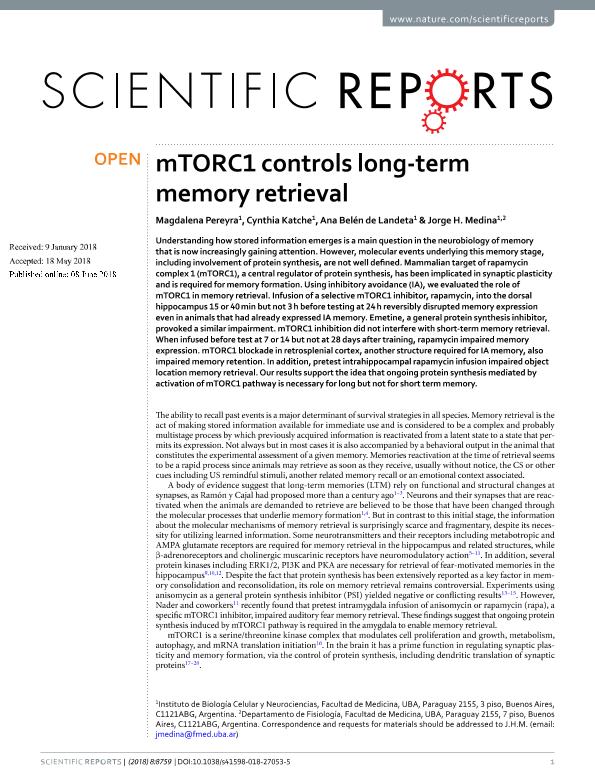Mostrar el registro sencillo del ítem
dc.contributor.author
Pereyra, Magdalena

dc.contributor.author
Katche, Cynthia Lorena

dc.contributor.author
de Landeta, Ana Belén

dc.contributor.author
Medina, Jorge Horacio

dc.date.available
2019-10-29T17:39:38Z
dc.date.issued
2018-12
dc.identifier.citation
Pereyra, Magdalena; Katche, Cynthia Lorena; de Landeta, Ana Belén; Medina, Jorge Horacio; MTORC1 controls long-term memory retrieval; Nature Publishing Group; Scientific Reports; 8; 1; 12-2018; 1-10
dc.identifier.issn
2025-2322
dc.identifier.uri
http://hdl.handle.net/11336/87556
dc.description.abstract
Understanding how stored information emerges is a main question in the neurobiology of memory that is now increasingly gaining attention. However, molecular events underlying this memory stage, including involvement of protein synthesis, are not well defined. Mammalian target of rapamycin complex 1 (mTORC1), a central regulator of protein synthesis, has been implicated in synaptic plasticity and is required for memory formation. Using inhibitory avoidance (IA), we evaluated the role of mTORC1 in memory retrieval. Infusion of a selective mTORC1 inhibitor, rapamycin, into the dorsal hippocampus 15 or 40 min but not 3 h before testing at 24 h reversibly disrupted memory expression even in animals that had already expressed IA memory. Emetine, a general protein synthesis inhibitor, provoked a similar impairment. mTORC1 inhibition did not interfere with short-term memory retrieval. When infused before test at 7 or 14 but not at 28 days after training, rapamycin impaired memory expression. mTORC1 blockade in retrosplenial cortex, another structure required for IA memory, also impaired memory retention. In addition, pretest intrahippocampal rapamycin infusion impaired object location memory retrieval. Our results support the idea that ongoing protein synthesis mediated by activation of mTORC1 pathway is necessary for long but not for short term memory.
dc.format
application/pdf
dc.language.iso
eng
dc.publisher
Nature Publishing Group

dc.rights
info:eu-repo/semantics/openAccess
dc.rights.uri
https://creativecommons.org/licenses/by-nc-sa/2.5/ar/
dc.subject
MEMORY RETRIEVAL
dc.subject
INHIBITORY AVOIDANCE
dc.subject
MTOR
dc.subject.classification
Neurociencias

dc.subject.classification
Medicina Básica

dc.subject.classification
CIENCIAS MÉDICAS Y DE LA SALUD

dc.title
MTORC1 controls long-term memory retrieval
dc.type
info:eu-repo/semantics/article
dc.type
info:ar-repo/semantics/artículo
dc.type
info:eu-repo/semantics/publishedVersion
dc.date.updated
2019-10-23T14:40:57Z
dc.journal.volume
8
dc.journal.number
1
dc.journal.pagination
1-10
dc.journal.pais
Reino Unido

dc.description.fil
Fil: Pereyra, Magdalena. Universidad de Buenos Aires. Facultad de Medicina. Instituto de Biología Celular y Neurociencias; Argentina. Consejo Nacional de Investigaciones Científicas y Técnicas; Argentina
dc.description.fil
Fil: Katche, Cynthia Lorena. Universidad de Buenos Aires. Facultad de Medicina. Instituto de Biología Celular y Neurociencias; Argentina. Consejo Nacional de Investigaciones Científicas y Técnicas; Argentina
dc.description.fil
Fil: de Landeta, Ana Belén. Universidad de Buenos Aires. Facultad de Medicina. Instituto de Biología Celular y Neurociencias; Argentina. Consejo Nacional de Investigaciones Científicas y Técnicas; Argentina
dc.description.fil
Fil: Medina, Jorge Horacio. Universidad de Buenos Aires. Facultad de Medicina. Instituto de Biología Celular y Neurociencias; Argentina. Consejo Nacional de Investigaciones Científicas y Técnicas; Argentina
dc.journal.title
Scientific Reports
dc.relation.alternativeid
info:eu-repo/semantics/altIdentifier/doi/http://dx.doi.org/10.1038/s41598-018-27053-5
dc.relation.alternativeid
info:eu-repo/semantics/altIdentifier/url/https://www.nature.com/articles/s41598-018-27053-5
Archivos asociados
